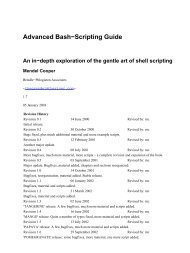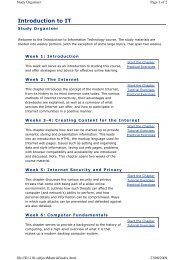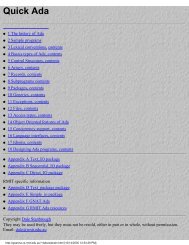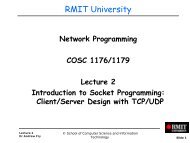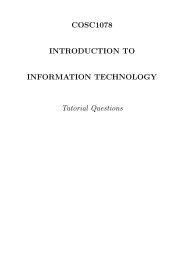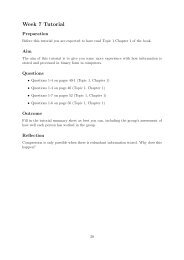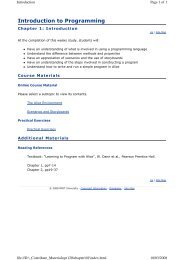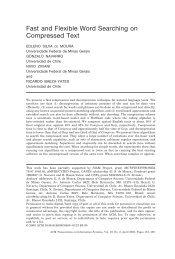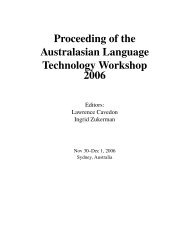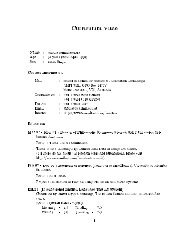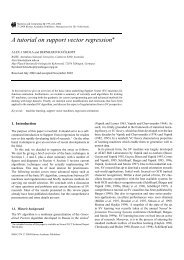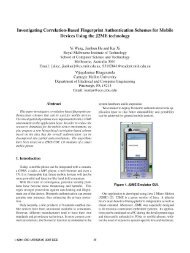The MBC information booklet - RMIT University
The MBC information booklet - RMIT University
The MBC information booklet - RMIT University
You also want an ePaper? Increase the reach of your titles
YUMPU automatically turns print PDFs into web optimized ePapers that Google loves.
Chapter 4: Bioinformatics<br />
4.2.2 MATH1300—<br />
Analysis of<br />
Medical Data<br />
4.2.3 BIOL2034—<br />
Bioinformatics<br />
4.2.4 COSC2151—<br />
Introduction to<br />
Computational<br />
Biology<br />
22<br />
Course Description<br />
This course aims to deliver postgraduate researchers the skills needed to analyse data<br />
specifically in a medical context. It covers both statistical and epidemiological techniques<br />
using a computer based approached, with all methods described from their foundation.<br />
Pre-requisite Courses and Assumed Knowledge and Capabilities<br />
This course assumes that the students have:<br />
• Basic IT skills including web browsing, e-mail, Windows based program usage, and<br />
the ability to use a word-processor for report writing<br />
• Fundamental mathematical skills to a graduate high-school standard<br />
• A basic knowledge of medical terminology<br />
For more <strong>information</strong> on the course, go to www.rmit.edu.au/courses2006/029566.<br />
Note: This course is offered by the School of Applied Sciences.<br />
Course Description<br />
Bioinformatics is the computational management and use of biological <strong>information</strong> to<br />
solve biological problems. This course will deliver descriptions of this rapidly evolving<br />
field, and facilitate user access to and manipulation of the biological data. Topics will<br />
include descriptions of genetic and biological databases and relevant tools available to<br />
retrieve and analyse the <strong>information</strong> within these. Descriptions of various techniques,<br />
such as evolutionary analysis, data mining, protein structure/function and computational<br />
drug discovery will be given. <strong>RMIT</strong> staff and external scientists working in the field will<br />
deliver topics. This course is designed to enable students to evaluate data using<br />
bioinformatics, and to better identify potential uses and opportunities of this data within<br />
their industry context. Students will gain an appreciation of the potential of new<br />
technologies to their industry sector.<br />
Pre-requisite Courses and Assumed Knowledge and Capabilities<br />
• BIOL2184 Advanced Molecular Biology (or equivalent)<br />
For more <strong>information</strong> on the course, go to www.rmit.edu.au/courses2006/028321.<br />
Aim<br />
As the rate of acquisition of biological data increases exponentially, the management,<br />
interrogation and manipulation of this data becomes a complex process that requires<br />
novel software solutions. <strong>The</strong>se solutions are the driving force behing Computational<br />
Biology, lying at the intersection between the biological and IT fields. <strong>The</strong>re is a<br />
requirement for methodology to facilitate the acqusition, storage and retrieval of data, the<br />
analysis of this data and computationally complex tasks such as the prediction of<br />
macromolecular structure. This course will introduce these concepts and demonstrate<br />
some of the computational techniques currently available.<br />
Objectives<br />
<strong>The</strong> objectives of this course are as follows:<br />
• Introduce the aims and uses of computational biology.<br />
• Describe the sources of data, in particular from the characterisation of genomes<br />
and proteomes.<br />
• Describe how biological <strong>information</strong> is stored and accurately retrieved.<br />
• Introduce computational algorithms that can be used for querying and manipulating<br />
biological data.<br />
• Study some of the practical uses of these algorithms.<br />
Prerequisites<br />
• COSC1321 Computing Fundamentals<br />
Syllabus<br />
• Genomics, proteomics and bioinformatics.<br />
- Introduction to the biological revolution. Data acquisition and storage.<br />
Databases- format and querying. <strong>The</strong> challenges in Computational Biology.



